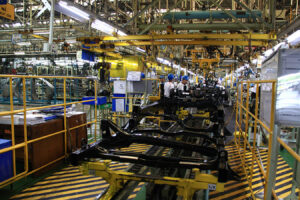AI-driven manufacturing may unlock more growth in PHL

By Aubrey Rose A. Inosante, Reporter
PHILIPPINE MANUFACTURERS should adopt regenerative processes driven by artificial intelligence (AI) to capture growth opportunities more effectively, according to global management consulting firm Kearney.
“Regenerative manufacturing presents an opportunity to optimize cost advantages and tap into the expanding domestic market, reinforcing the country’s position as a key player in regional manufacturing,” Keat Yap, a partner and Asia-Pacific co-lead for Operations and Performance at Kearney, told BusinessWorld on Tuesday.
He noted that while the Southeast Asian nation is in track for strong manufacturing growth, it lags peers like Vietnam and Malaysia in capturing macroeconomic trends including avoiding investing only in China.
Regenerative manufacturing is a strategy that not only tries to lower the ecological footprint of production but also seeks to restore ecosystems, communities and economies.
Mr. Yap, who co-wrote a report on the strategy for the Southeast Asian region released on Tuesday, said a product design-led value chain and faster adoption of AI would help Philippine manufacturers maximize opportunities.
“Our view is that ASEAN (Association of Southeast Asian Nations) manufacturers, including those in the Philippines, should think of AI beyond manufacturing automation, but also leverage AI to reimagine and optimize value chains to best yield benefits of regenerative manufacturing,” he said in an e-mailed reply to questions.
Kearney expects the Philippines’ gross manufacturing output to reach $400 billion by 2030 or 5% growth, compared with 6% growth for ASEAN to $1.2 trillion.
“It is imperative for ASEAN manufacturers to use their competitive advantages and capitalize on the favorable tailwinds to capture this growth opportunity,” according to the report.
Mr. Yap said AI forms the basis of the operating model for any company aiming to adopt regenerative manufacturing.
Kearney said ASEAN companies are nonleaders or followers in AI, which is unsurprising given its cost and novelty. “However, it is promising to see that 41% of the Philippines’ manufacturers recognize the criticality of AI implementation, which can lead to further investment in the future,” he added.
A quarter of Philippine industry leaders in manufacturing rated their companies as “leading” in AI adoption, the highest in the region, surpassing Indonesia (22%), Singapore (21%), Vietnam (20%), Thailand (20%), and Malaysia (18%).
MISSING OPPORTUNITIES“Our study revealed that despite only 23% of ASEAN manufacturers rating their businesses as leading in AI, AI implementation was the topic at the top of their minds, with nearly 50% of them identifying it as the most crucial manufacturing trend they see today,” Kearney said in the report.
Mr. Yap said regenerative manufacturing is a “mid-to-long-term play,” especially when it comes to AI adoption. It takes time for companies to identify and invest in areas that will benefit from AI.
Except for Singapore at $68 per capita, ASEAN nations lag global peers in terms of AI investment — $2 per capita versus $155 per capita in the US and $21 per capita in China, Kearney said.
Karthik Chandrasekaran, principal for client engagement at IBM Technology, said the Philippine manufacturers lag in AI adoption compared with countries like Singapore, which leads with advanced integration driven by strong government support and a robust digital infrastructure.
“Without proactive measures, there is a risk of missing significant opportunities presented by AI advancements that other countries are already capitalizing on,” he said in an e-mailed reply to questions.
Mr. Chandrasekaran cited the skill gap and limited technological resources that hinder Philippine progress, even as he expects a considerable rise in AI adoption in manufacturing next year. “As organizations recognize technology’s critical role in maintaining competitive advantage, there will be an increased focus on strategic investments in AI.”
In the report, Kearney urged ASEAN manufacturers to think beyond production floor automation and explore how AI can drive product design and transform the entire supply chain.
By embedding AI from the beginning, manufacturers can achieve “significant improvements in processes and outcomes to meet the growing regulatory demands for sustainability and climate action,” it said.
John Paolo R. Rivera, a senior research fellow at the Philippine Institute for Development Studies, said AI adoption should be reinforced.
“This may be due to lack of full understanding on how to leverage the technology,” he said in a Viber message. “Ethical concerns in the use of AI also add to the hesitation.”
He said adequate capacity-building, information dissemination and proof of AI’s benefits could speed up its adoption. “Adoption cannot be forced. Instead, it can be facilitated through evidence-based research, effective information dissemination, and appropriate training on its ethical use,” he added.




